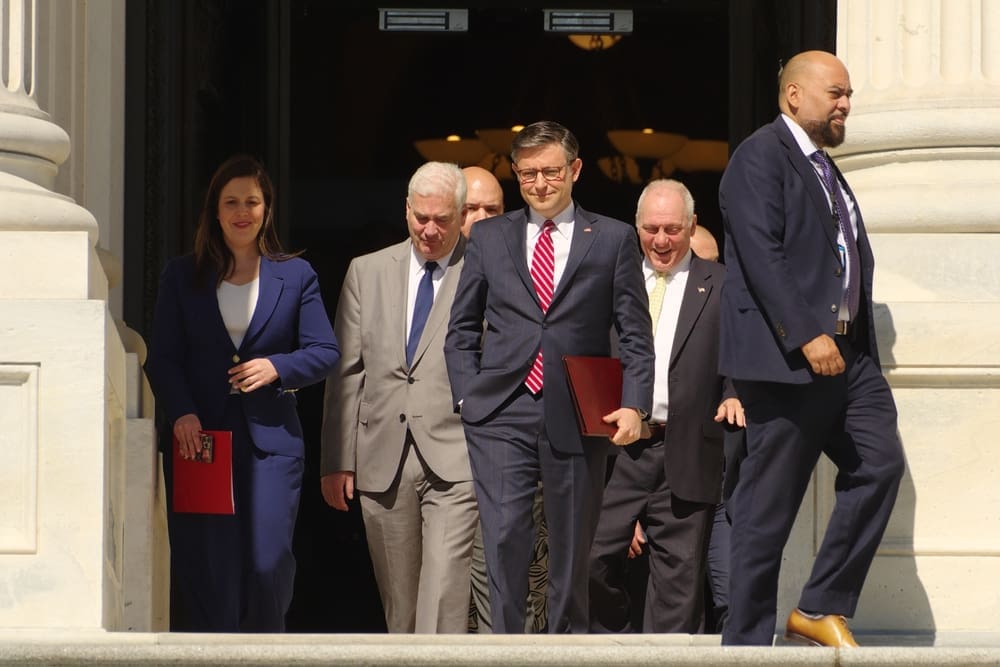WASHINGTON – The Republican party is confronting a high-stakes, make-or-break weekend as an escalating internal war over spending cuts threatens to derail President Donald Trump’s signature domestic agenda, forcing a rare and tense weekend session in the U.S. Senate. With a July Fourth deadline imposed by the President looming, GOP leadership is racing to unify a fractured caucus behind a massive tax and spending package, but defections from both moderate and conservative senators have put the entire effort on the brink of collapse.
The legislative chaos peaked late Friday night with the release of a sprawling, 940-page bill just hours before senators were expected to begin a critical procedural vote on Saturday. The bill, which aims to make permanent some $3.8 trillion in Trump-era tax breaks, has become a battleground for the soul of the Republican party. Moderates are recoiling from the deep and painful cuts to Medicaid, food stamps, and other social programs required to offset the cost, while hard-line conservatives, alarmed by the national debt, argue the cuts don’t go nearly far enough.
This internal strife has turned what GOP leaders hoped would be a triumphant legislative march into a desperate scramble, underscoring the deep ideological divisions that threaten to paralyze the party’s ability to govern.
“It’s evolving,” a weary Senate Majority Leader John Thune conceded late Friday, acknowledging the profound uncertainty hanging over the chamber.
The core of the legislation is politically popular among Republicans: making permanent the tax cuts from Trump’s first term that are set to expire at year’s end, a scenario that would result in a significant tax increase for millions of Americans. The package also includes new populist sweeteners, such as making all tips tax-free, alongside a hefty $350 billion commitment to national security, which incorporates funding for the president’s controversial mass deportation agenda.
But the plan’s fiscal architecture is what has sparked the rebellion. To pay for the tax cuts, the bill proposes sweeping reductions in federal social programs, a move that has made several GOP senators from states with vulnerable populations balk. The political poison of cutting healthcare for the poor to fund tax breaks for corporations and the wealthy has become too toxic for some.
Senator Thom Tillis of North Carolina, a key moderate, delivered a stunning blow to leadership’s plans late Friday, announcing he would vote against even allowing the bill to be debated. “I’m voting no on the motion to proceed,” Tillis stated flatly, citing fundamental concerns with the package. His opposition means GOP leaders must now find a vote elsewhere or risk a humiliating public failure on the Senate floor.
Simultaneously, the bill is taking fire from the right flank. Senator Ron Johnson of Wisconsin, a leading fiscal hawk, has withheld his support, demanding deeper spending cuts to address the nation’s soaring debt. The dual-front opposition leaves Senator Thune with an almost impossible task of navigating between senators who believe the bill is too cruel and those who believe it is not austere enough.
The process has been further complicated by a series of procedural defeats at the hands of the Senate parliamentarian, the non-partisan arbiter of the chamber’s arcane rules. Several key Republican proposals were initially stripped from the bill for violating the “Byrd Rule,” which bars extraneous policy matters from being included in budget legislation that can pass with a simple majority. GOP leaders were forced into a frantic, last-minute rewrite after provisions to shift food stamp costs to the states and gut the funding structure of the Consumer Financial Protection Bureau were ruled out of order.
While Republicans managed to revise and reinstate versions of those proposals—including a modified cut to a Medicaid provider tax paired with a new $25 billion fund to appease senators worried about rural hospitals—the chaotic process has only fueled further distrust among rank-and-file members.
As the legislative drama unfolds, President Trump has been applying intense public pressure from the White House, admonishing the “grandstanders” among the GOP holdouts and urging them to fall in line. “We can get it done,” Trump declared in a social media post. “It will be a wonderful Celebration for our Country.” Yet his intermittent pressure campaign has done little to soothe the divisions.
Adding to the complexity, the bill’s treatment of the state and local tax (SALT) deduction remains a major unresolved issue, particularly for lawmakers in high-tax states like New York. With the White House, House, and Senate Republicans all holding different positions on where to set the cap, a final compromise remains elusive, and at least one House Republican, Rep. Nick LaLota of New York, has said he cannot support the current plan.
Democrats, unified in their opposition, have seized on the Republican disarray. Senate Democratic Leader Chuck Schumer of New York accused the GOP of rushing a deeply flawed bill to meet an arbitrary deadline before the public can understand its damaging consequences. “There’s no good reason for Republicans to chase a silly deadline,” Schumer said.
The nonpartisan Congressional Budget Office has already projected that the House-passed version of the bill would deliver an average tax cut of $12,000 to top income-earners while handing the poorest Americans a $1,600 tax increase. The CBO also estimated that 10.9 million more people would be without health insurance and at least 3 million fewer would qualify for food aid. The Senate version, with its even steeper cuts, is expected to produce more severe figures.
With razor-thin majorities in both chambers, Republican leaders can afford almost no defections. House Speaker Mike Johnson sent his members home for the weekend but put them on call to return to Washington at a moment’s notice. “We are very close,” he insisted, but the path forward is fraught with peril. The Senate must first pass the procedural vote, endure at least 10 hours of debate, and survive an all-night “vote-a-rama” on countless amendments before a final vote, which could still be days away. Should it pass, the bill must then return to the House for final approval. The weekend session is not just about a piece of legislation; it’s a defining test of the Republican party’s ability to govern and a high-stakes gamble for President Trump’s second-term agenda.














